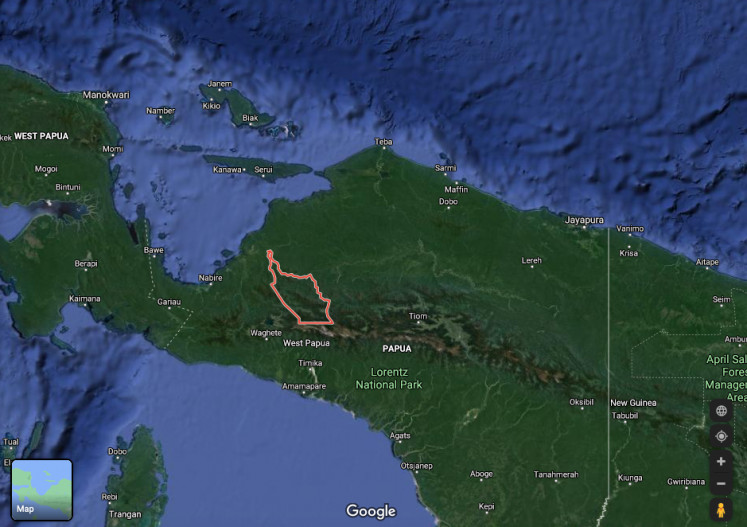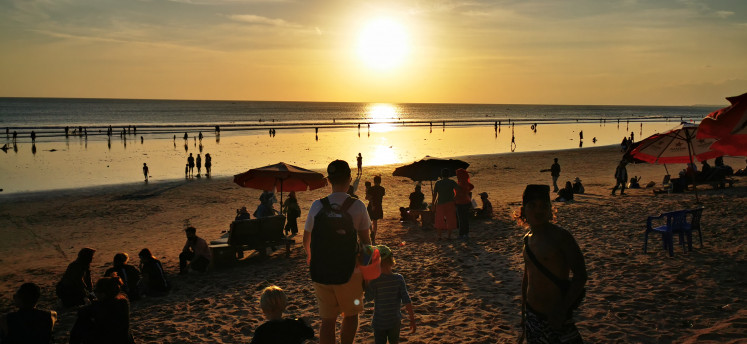Academic freedom and defense policy
Recently, there was some controversy following the dismissal of a prominent human rights activist from his teaching responsibilities at the Indonesian Defense University (IDU)
Change text size
Gift Premium Articles
to Anyone

R
ecently, there was some controversy following the dismissal of a prominent human rights activist from his teaching responsibilities at the Indonesian Defense University (IDU). Both the activist and university officials confirmed that the source of the acrimony was the former’s several newspaper opinion pieces criticizing the government’s weapons procurement plans.
Indeed, according to IDU rector Lt. Gen. (ret.) Syarifuddin Tippe, as quoted by The Jakarta Post, the activist, by being a member of the university, “had become [a member of] our defense community who should have consulted his colleagues here first before writing in the newspaper”. He added that what the activist had written was not entirely correct, and that he had previously been warned for his actions.
Meanwhile, those who rallied behind the activist argued, both offline and online via Twitter and Facebook, that the suspension suggested that the IDU was becoming increasingly “authoritarian”, and that the university should not infringe upon “academic freedom”.
Others went so far as to say that if the university started punishing or dismissing people for voicing their academic opinions, then we should question the quality of their graduates. Others still argue that the IDU is not “military property”.
As emotions continue to run high, and despite some factual inaccuracies in this exchange, I am not aiming to be a judge here; I am writing this only to highlight the larger issues at stake. First of all, consider the charge that the IDU is damaging “academic freedom”.
The American Association of University Professors, an organization of professors that since 1915 has been the primary source of various documents outlining the basic principles and responsibilities of the academic community, believes that, among other things, academic freedom means that both faculty members and students can engage in intellectual debates without fear of censorship or retaliation.
It also means that an academic has the right to remain true to his or her pedagogical philosophy and intellectual commitments, and protects both faculty members and students from reprisals for disagreeing with administrative policies or proposals.
Academic freedom, however, does not protect an academic or faculty member from investigations into allegations of scientific misconduct or violations of sound university policies — nor does it protect them from disciplinary action or sanctions for professional misconduct.
That said, any charges of academic and/or professional misconduct must be proven in a hearing of record or a forum before an elected faculty body underpinned by fair treatment and due process. More importantly, academic freedom also gives faculty members the right to seek redress, or request a hearing for such, if they believe their rights have been violated.
In our case, if the said activist truly believes that his “academic freedom” has been violated because his opinion pieces criticizing the government were based on scientific or scholarly research — and thus qualifies as “academic work or opinion” — then by all means he should lodge a formal complaint to the university and seek a hearing.
If we truly wish to fight for our rights as academics, then fighting our battles through the media or in the public domain without previously using the available academic or university channels could leave us open to accusations of rabble-rousing or political activism as opposed to maintaining sound academic integrity and work.
It should also be noted that the majority of national defense universities or military-related educational institutions in the world operate rather differently from their civilian counterparts.
They have different rules and regulations that are more restrictive, even for publishing academic work. In fact, it is rare to find academics working full-time in a national defense university who can freely publish opinion pieces without some prior vetting process.
Second, this IDU dismissal saga is merely a recent example of the growing gap between defense policymakers and Indonesia’s civil society groups.
While there was close cooperation between the defense establishment and various civil society groups and civilian experts in the late 1990s and early 2000s, both sides have become estranged since then. The Defense Ministry and the Indonesian Military (TNI) prefer to formulate many of their key policies without serious input from the wider civil society community, while civil society groups prefer to launch attacks and harsh criticisms of those policies without offering sufficient alternative solutions.
As I have consistently argued over the years, moving the process of defense transformation forward in the long haul requires a strong and constructively critical civilian defense community.
This does not mean that civilian experts and activists should always compromise their intellectual or professional opinions, or that the Defense Ministry should always blindly follow what civilian experts say.
But it does mean that both sides need to listen better and work together to address the key institutional, operational and strategic challenges facing the country and the military.
Whatever the reason behind this gap, bridging it is a critical component in the overall effort to bring about better alternative policy solutions from both sides.
Finally, as far as military education goes, regardless of the specific context (academic or otherwise) within which the IDU was proposed and established, one should not simply dismiss or discount the institution’s long-term significance.
Any long-term solution to Indonesia’s defense transformation process — whether it involves defense industrial revitalization, or the procurement of complex weapons systems — depends on a sound and professional educational system for both our officers and civilian policymakers.
If there are shortcomings within the IDU’s scholarly and pedagogical environments, then shouldn’t it be our job to make them better?
The writer is a researcher with the Centre for Strategic and International Studies (CSIS), Jakarta, and a PhD student in political science at the Maxwell School of Citizenship and Public Affairs, Syracuse University, US









